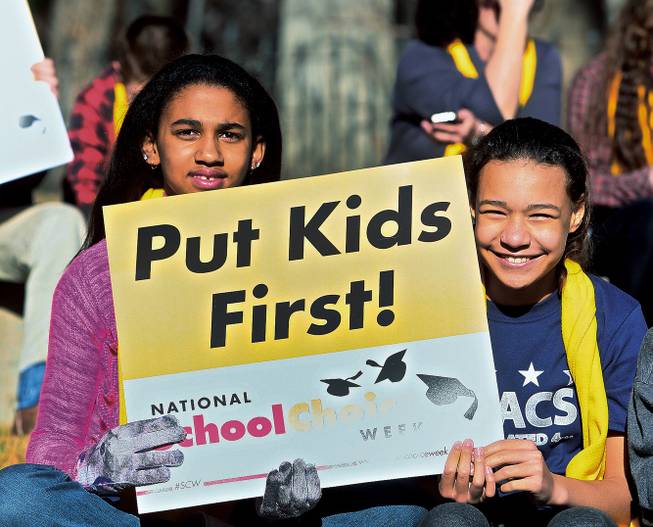
Brad Coman / Nevada Appeal / AP
Students Isabel Onisile, 11, and Octavia McKindra, 11, attend a rally at Sierra Nevada Academy Charter School at the National School Choice Week Capitol celebration Wednesday, Jan. 28, 2015, in Carson City.
Thursday, May 19, 2016 | 2 a.m.
Related news
Supporters of the country’s most sweeping school choice program finally have a reason to celebrate.
On Wednesday, following months of back and forth in Las Vegas courtrooms, a lawsuit filed by the American Civil Liberties Union against Nevada’s new education savings account program was thrown out by a Clark County judge who said it didn’t violate the state’s prohibition on public money used for religious purposes.
For the program’s proponents, it’s a welcome turning of tables after a string of legal setbacks. The ACLU filed its lawsuit in August, as was expected, but it only got ugly in January after a second lawsuit prompted a Carson City judge to suspend the program.
By then nearly 6,000 families — many of them low-income — had already applied for money through the program. They fell into limbo as lawyers duked it out, ruining their plans for the upcoming school year.
Even though the program is still on hold while the second lawsuit works its way up to the high court, where it has a chance of being struck down, supporters say this week’s news edges the odds in their favor.
“I’m just a simple school administrator, but we all know that courts operate through precedent,” said Scott Hammond, the Republican from Indian Springs who proposed the program, workshopped it with national school choice groups and saw it through to passage.
“They typically don’t overturn what’s already been done,” he said over the hubbub of an event he was attending in Washington, D.C. “I don’t think they can overturn this so quickly.”
The news was quickly met with fanfare by supporters. Gov. Brian Sandoval, who signed the bill into law, called it a “victory for thousands of Nevada families who are pursuing the opportunity to choose the best education path for their children.”
Legislators who voted for the program and the grass-roots activists defending it reacted with similar enthusiasm, but the issue transcends the Silver State.
“Fantastic news,” tweeted Jeb Bush, a school choice advocate and supporter of voucher programs and their toned-down counterpart, education savings accounts.
The program itself allows families to take a portion of the money the state would otherwise use to pay for their children’s education in public school and put it in a state-managed savings account. There they can use the money — around $5,000 per student in most cases — to finance their own education, be it through private schools or a combination of both, the idea being if it’s education-related it’s fair game.
But that’s where the program diverged from a handful of other education savings accounts enacted in states like Arizona and Tennessee. Where traditional ESA programs are limited to the poor or families with special-needs students, as is the case in Arizona, Nevada’s version is open to anyone, from the poorest to the wealthiest.
Which is why Wednesday’s ruling is such a big deal. Education insiders around the country are keeping a close eye on the Nevada program, and its success or failure could determine whether similar sweeping programs are pushed in other states.
When it comes to the ACLU’s lawsuit, the judge dismissed the group’s argument that Nevada’s constitution only tasks the Legislature with ensuring a public school system.
“The framers indicated they intended to create two duties, a broad one to encourage education by ‘all suitable means,’ and a specific, but separate, one to create a uniform public school system,” judge Eric Johnson wrote in his opinion. “The Legislature can provide for a uniform system of common schools, free from religious instruction and open to general attendance by all Nevada children, and still adopt other suitable means of encouraging education.”
Johnson also dismissed the ACLU’s contention that allowing public money to be used to pay tuition at private religious schools violates the state constitution, which has been a central argument in lawsuits against ESA and voucher programs elsewhere.
The ACLU’s reaction to the ruling was guarded. Although the group also has the ability to appeal to the Supreme Court, officials haven’t said whether they’ll do it.
"We are disappointed by the court's decision,” Nevada ACLU legal director Amy Rose said in a statement. “Nevada's voucher program allows private religious schools to use taxpayer dollars to indoctrinate and discriminate against students on the basis of religion, sexual orientation, gender identity, disability, and other grounds.”
“[We] are studying the opinion, and we will make a decision on next steps soon,” Rose said in the statement.
For now, supporters are basking in the victory. On the horizon are more hearings, this time before the state Supreme Court, but they’re used to it by now.
“The history of the education choice movement has been one in which legislatures pass [programs], and litigation happens,” Hammond said. “That comes with the territory.”

Join the Discussion:
Check this out for a full explanation of our conversion to the LiveFyre commenting system and instructions on how to sign up for an account.
Full comments policy